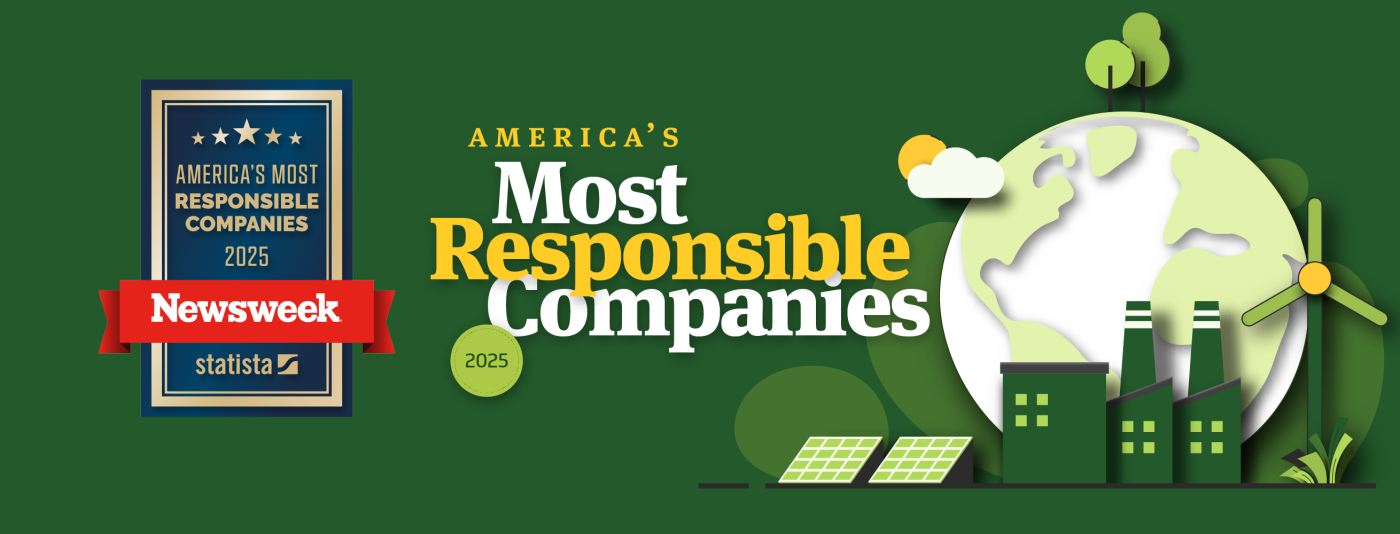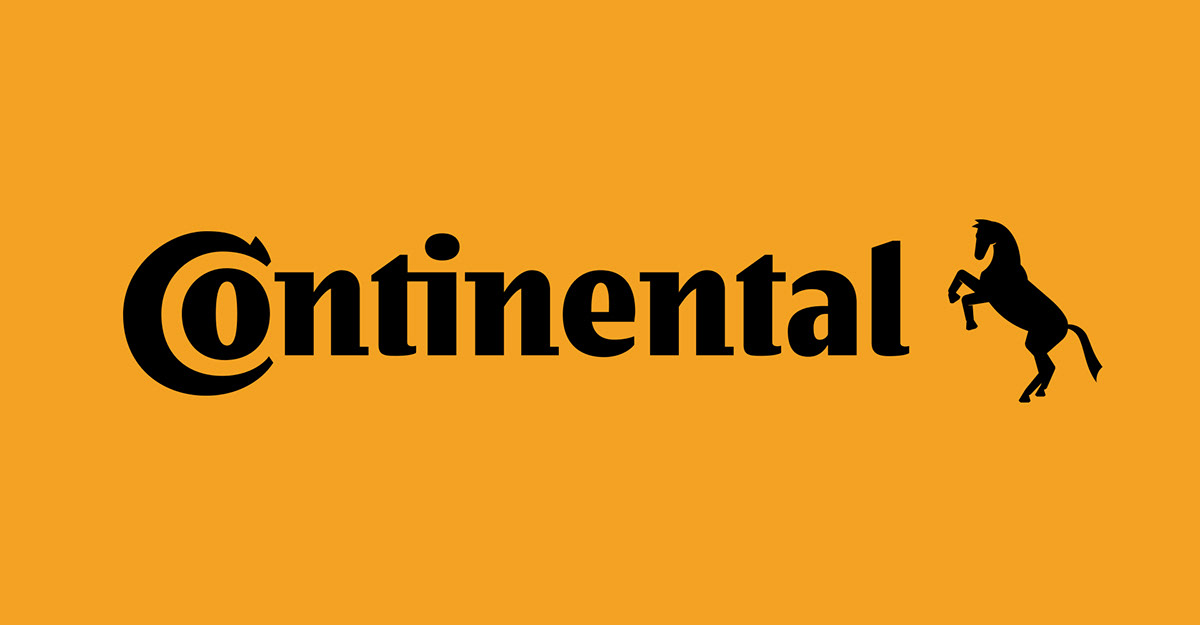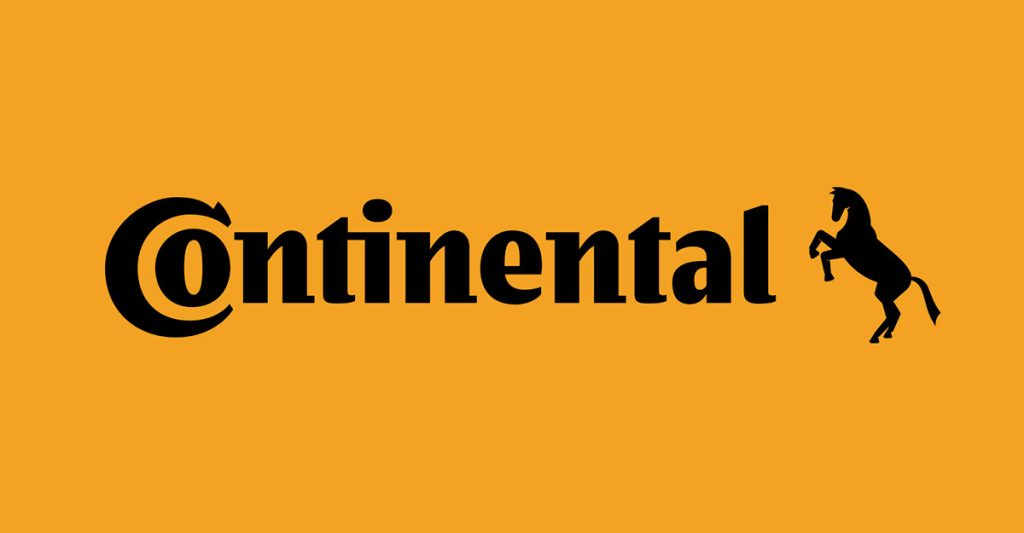Key Figures in Africa
Source ‘World Health Organization’
Updated: 22/10/2020 11:30 GMT
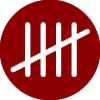
309.523
Total confirmed cases

152.402
Active confirmed cases

148.968
Recovered cases

8.153
Confirmed deaths
Daily evolution of the Covid-19
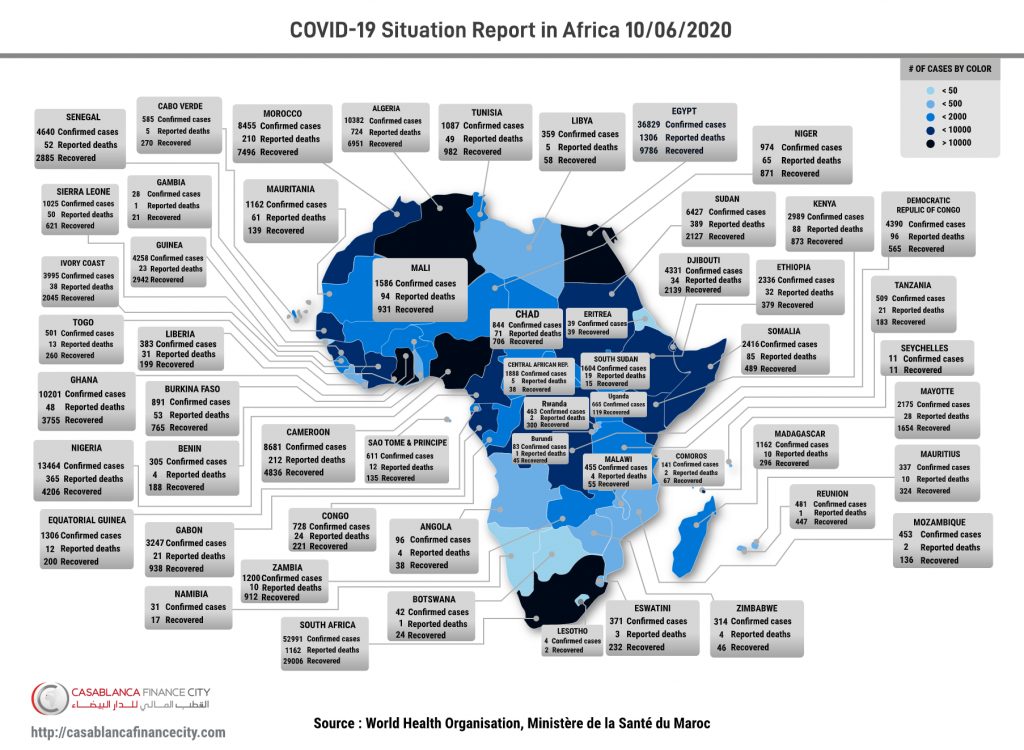
Casablanca Finance City keeps you up to date on the COVID-19 situation report in Africa.
54 African countries affected by COVID-19.
309,523 African cases vs 8,758,301 worldwide.
Evolution of Covid-19 in Africa
Casablanca Finance City keeps you up to date on the COVID-19 situation report in Africa.
COVID curve in 10 African countries.
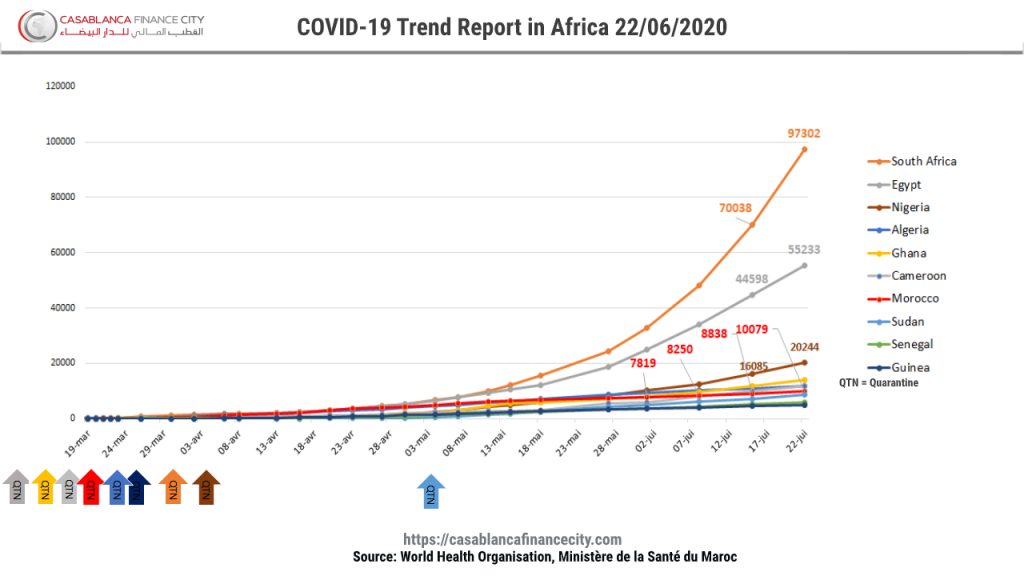
Covid-19 related measures
Algeria, with 5,891 confirmed cases, has started producing rapid COVID test kits. The government has announced that the kits have a detection time of 15 minutes and a production capacity of 200,000 units per week.
The Algerian laboratory produced these kits in collaboration with Canadian and Jordanian firms. The country has allocated $100 million to import medical equipment and pharmaceutical products to help fight the virus.
Measures continue to be imposed nationwide with mandatory curfew, closure of most businesses and suspension of public transport.
Ethiopia, with 194 confirmed cases, has instituted a wide range of measures to contain the spread of COVID-19.
In April, a five-month state of emergency was announced to stop the spread of COVID-19 in the country.
The Ethiopian Airlines Group has almost doubled its cargo capacity and deferred two months of plane-lease payments to help navigate the aviation crisis caused by the Covid-19 outbreak.
In addition, Ethiopia steps up Health Spending with help from IMF Emergency Assistance. The IMF has approved $411 million in emergency assistance for Ethiopia to help fight the coronavirus pandemic in the east African country.
Gabon has created a special COVID fund endorsed with 25 billion FCFA to help control the negative impacts on the country. In addition, a collection of measures have been put in place including:
– Libreville confined for 15 days
– 60 testing centers have been installed around the country
– Water and electric bills covered for vulnerable communities
– Rent payments suspended
– Free public transport
– Unemployment allowance
– Food and supply aid for struggling communities
Ghana, with 1154 confirmed cases, has lifted lockdown after three weeks of confinement and is the first African country to do so. Non-essential businesses will be able to reopen, while the wearing of masks remains highly encouraged. The president has announced that the decision is based on the country’s “ability to undertake aggressive contact tracing of infected persons, the enhancement in the capacity to test, and the expansion in the numbers of treatment and isolation centers”.
Since Ghana eased its lockdown, the number of confirmed cases has almost tripled to now, 3091 compared to 1,154. However, the government has explained that it has allowed them to assess Ghana’s needs, and gave authorities the time to boost health infrastructure, testing capacity, and pinpoint where the outbreaks were.
In addition, the government announced the start of the largest investment in the country’s healthcare, with 96 new hospitals planned for the next year and improved services.
Ivory Coast, with 1,464 confirmed cases has implemented measures to sustain businesses:
– Suspension of tax audits for a period of 3 months
– Postponement of tax payments for a number of industries, such as hotel and tourism
– Reduction of the transport license by 25%
– Exemption of certain duties and taxes on health equipment
– Reimbursement of VAT credits within 2 weeks
Kenya, with 384 confirmed cases, seeks to implement a collection of reliefs to help businesses during this challenging period.
These measures include:
– Reduction of corporation tax – Reduction of turnover tax rate
– Temporary suspension of listing with Credit Reference Bureaus of any person, SME or corporate entities whose loan accounts fall due or is in arrears effective 1 April 2020
– Immediate reduction of Value Added Tax (VAT)
– All ministries to pay KES13 billion of all verified pending bills within 3 weeks from 25 March 2020 to improve liquidity in economy and ensure businesses remain afloat
– The private sector to clear all outstanding payments within 3 weeks
– The Kenya Revenue Authority to expedite payment of all VAT refund claims within 3 weeks amounting to KES 10 billion.
Mali, with 224 confirmed cases, has implemented a collection of measures to help fight the spread of the COVID-19 and control the negative affects it has had on the population. Some of these measures include mandatory mask wearing, curfews, a special fund endorsed with 100 Bn XOF for vulnerable communities and more.
The Moroccan government has implemented a collection of urgent economic, financial and social measures:
Creation of a special fund dedicated to the management of the Coronavirus pandemic
- A Special Trust Account entitled “Special Fund for the Management of the Coronavirus Pandemic” has been created. Endowed with 10 billion dirhams, this fund will be reserved, on the one hand, to cover the costs of upgrading the medical device, in terms of adapted infrastructure and additional means to be acquired, in an emergency. In this context, a substantial effort has been made for the benefit of the health sector, with the allocation of 2 billion dirhams to strengthen the medical system.
Setup of an Economic Watch Committee
The committee has been established at the level of the Ministry of the Economy, Finance and Administration Reform and is involving key stakeholders such as the Moroccan Central Bank (Bank Al Maghrib) and the federation of Moroccan enterprises (CGEM). This committee is responsible for monitoring the development of the economic situation and identifying appropriate support measures such as:
- The suspension of payment of social charges
- Establishment of a moratorium on the repayment of bank loans to companies
Measures taken by Bank Al Maghrib
- Bank Al-Maghrib, after dropping its policy rate to 2%, has adopted a set of new monetary and prudential policies to support access to bank credit for the benefit of both households and businesses.
- The central bank took prudential measures to support credit institutions covering liquidity, equity and provisioning of claims in order to strengthen the capacity of these institutions to support households and undertaken in these exceptional circumstances.
Measures for businesses, SMEs, and liberal professions in difficulty:
- Suspension of the payment of social charges until end of June 2020
- Establishment of a moratorium for the reimbursement of bank loan until end of June without payment of fees or penalties
- Activation of an additional operating credit line granted by the banks and guaranteed by the CCG
- Acceleration of payments for the benefit of businesses and SMEs, in order to reduce the pressure on their cash flow and allow them to fulfill their financial obligations
Tax measures:
- Companies whose turnover for the 2019 financial year is less than 20 M Dhs may, if they wish, benefit from a postponement of the filing of tax declarations until end of June 2020
- Suspension of tax audits and ATD until end of June 2020.
Support measures for the informal sector
The country has announced 12 functional testing laboratoires, which can test up to 1,500 samples daily.
Nigeria, with 1,337 confirmed cases, has joined Gabon in the African countries who have decided to relax lockdown measures. Inter-state borders will remain closed except for basic necessities and the wearing of masks in public places will be mandatory, as well as social distancing measures.
Nigeria, with 2802 confirmed cases, recently began easing confinement measures to mitigate economic impacts. The country has turned to a few digital solutions for logistical challenges as a result of supply-chain disruptions. Nigeria was already leading the way in the digitalization of logistics processes, with the startup, Kobo360, which is an Uber-like app connecting cargo and truck owners with drivers and customers.
The government has set up measures to help against the COVID-19, which include:
– Free SMS & digital payments to help the difficulties of social distancing
– The Central Bank of Rwanda eased conditions of repayments on loans
– Door-to-door food delivery to households in need
– Top officials have sent their salaries to a special fund dedicated to social protection
Rwanda has reviewed the existing measures and approved the following:
– Mass screening and testing nationwide
– Masks must be worn in public
– All resumed services must respect health guidelines
– Electronic and mobile payments to be used when possible
Services to reopen:
– Public and privates business with essential staff on site only
– Markets will open with essential vendors
– Manufacturing and construction businesses with essential staff on site only
– Hotels and restaurants until 7pm
– Individual sporting activities in open spaces
– Public and private transport within the same province
Services to remain closed:
– Schools until September 2020
– Places of worship
– Gyms & recreational centers
– Borders remain closed except for goods and cargo and returning citizens
Senegal is partnering with UK company Mologic to produce ergonomic testing kits that will be made available to the public at an affordable price.
Senegal, with 2,105 confirmed cases, has announced the easing of lockdown measures. The country will be re-opening places of worships and markets and shortening of curfew hours. In order to best mitigate economic and financial damages, the president has stated that the country must “learn to live in the presence of the virus.”
The South African Central Bank announced that it will restructure its market liquidity management strategy, which will give some relief to banks and funding markets affected by the global market crash due to Covid-19. In addition, South Africa has announced that, starting May 1, the government will allow a partial reopening of the economy. Travel restrictions will be eased and some industries will be authorized to operate under a five-level risk system
Tunisia, has been able to capitalise on its strong industrial sector. A number of companies have redirected their production to supply the health care industry with essential equipment. With more than 1600 textile companies in the country, the demand for protective clothing and masks is able to be achieved.
Uganda, with 79 confirmed cases, has decided to ease lockdown measures. Each sector of the government will develop a plan for a progressive reopening of the country. In addition, the country has put in place a collection of measures to support businesses, which includes:
– An extension on the deadline for tax payments
– The Central Bank of Uganda (BOU) has committed to provide liquidity assistance to financial institutions on a need-basis for a period of 1 year
– Reduction of charges for digital/mobile payments
– Reduction of the BOU Central Bank Rate (CBR)
– Granting exceptional permission to SFIs to restructure loans of corporate and individual customers that have been affected by the pandemic
Djibouti, with 1,210 confirmed cases, has decided to delay lifting lockdown, which was planned for Monday. The country has instead, extended lockdown until May 17. Djibouti has been on nationwide lockdown since March 23. It closed borders and places of worship, banned public transport and allowed only workers in essential industries to go outdoors. The decision is based on the pre-requisite conditions for lifting lockdown, not being in place yet.



